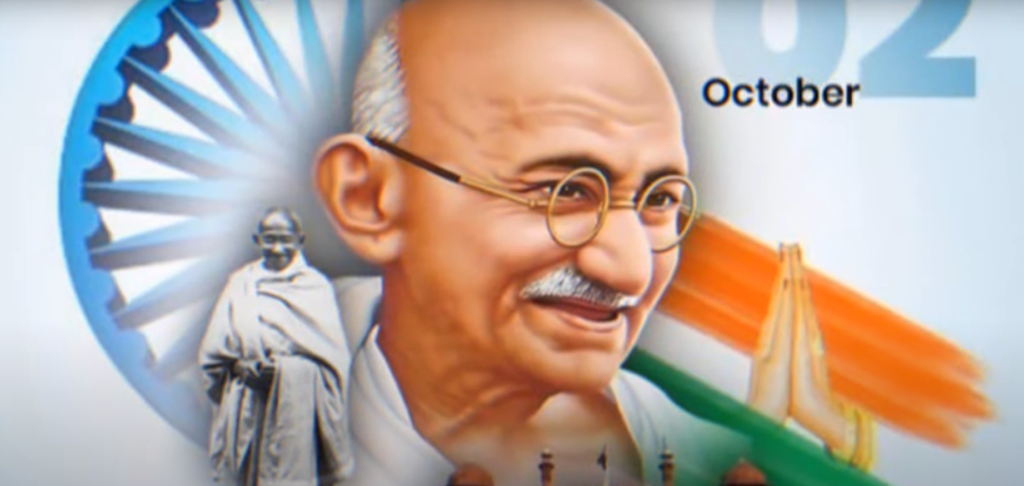
Introduction
Gandhi Jayanti is a national holiday in India, celebrated every year on 2nd October. It marks the birth anniversary of Mahatma Gandhi, one of the most revered figures in Indian history. Known as the “Father of the Nation,” Gandhi’s contributions to India’s freedom struggle and his philosophy of non-violence have left an indelible mark on the world. His principles of truth, non-violence, and peace continue to inspire millions, making Gandhi Jayanti not just a day of remembrance but also a day of reflection.
Who was Mahatma Gandhi?
Mahatma Gandhi, born as Mohandas Karamchand Gandhi on 2nd October 1869, in Porbandar, Gujarat, was a prominent leader in India’s fight for independence. His unique approach of non-violent resistance, also known as Satyagraha, played a pivotal role in India achieving freedom from British colonial rule in 1947. Gandhi was also a social reformer who worked tirelessly to remove social evils such as untouchability and promote equality among all sections of society.
The Importance of 2nd October
The day is significant not only because it is Gandhi’s birth anniversary but also because of the values it represents. Non-violence (Ahimsa) and truth (Satya) were the core tenets of Gandhi’s philosophy, and these are what make 2nd October a day of great importance in the global context. The United Nations has also declared this day as the International Day of Non-Violence, making it a day that resonates with peace movements across the world.
How is Gandhi Jayanti Celebrated?
Gandhi Jayanti is a national holiday in India, and various activities take place across the country to commemorate Gandhi’s life and work. The day usually begins with prayers and tributes at Gandhi’s memorial at Raj Ghat in New Delhi. Dignitaries, including the President and Prime Minister of India, pay homage by offering flowers at his memorial. Schools, colleges, and other institutions organize events such as essay writing, speeches, and debates on Gandhi’s life and teachings. Additionally, cleanliness drives inspired by Gandhi’s emphasis on cleanliness and hygiene are organized in various parts of the country.
Gandhi’s Philosophy of Non-Violence (Ahimsa)
One of the most enduring aspects of Gandhi’s legacy is his unwavering belief in Ahimsa, or non-violence. Gandhi believed that violence only begets more violence, and that real strength lies in controlling one’s anger and frustration. His campaigns, such as the Non-Cooperation Movement and the Salt March, were powerful examples of how peaceful resistance could bring about significant political and social change.
Truth and Honesty in Gandhi’s Life
Another cornerstone of Gandhi’s philosophy was truth. For Gandhi, living an honest life was not just about telling the truth but about practicing it in every action, thought, and decision. His concept of Satyagraha, or the “insistence on truth,” became the foundation for his method of protest. Gandhi believed that truth is the ultimate force that can drive away injustice and oppression.
Gandhi’s Role in India’s Freedom Struggle
Gandhi’s leadership in the Indian independence movement was unique. Unlike many other freedom fighters who took up arms, Gandhi advocated for peaceful protest. His strategies, such as boycotting British goods, organizing peaceful marches, and encouraging self-reliance through Khadi (hand-spun cloth), weakened the British economic and administrative grip on India. His most famous protest, the Salt March of 1930, was a direct challenge to British authority and highlighted the power of collective, non-violent action.
The Relevance of Gandhi’s Teachings Today
Even though Gandhi passed away more than 70 years ago, his teachings remain incredibly relevant in today’s world. In an era marked by conflict, inequality, and environmental degradation, Gandhi’s ideals of simplicity, self-reliance, and non-violence offer valuable lessons. Many global leaders, including Martin Luther King Jr. and Nelson Mandela, have drawn inspiration from Gandhi’s methods to lead their own movements for civil rights and freedom.
Gandhi and Social Reform
Gandhi was not only a political leader but also a social reformer. He worked relentlessly to uplift the marginalized sections of society, especially the Dalits or untouchables, whom he referred to as Harijans, or “children of God.” Gandhi’s efforts to eradicate untouchability and promote equality remain a significant aspect of his legacy.
Educational Impact of Gandhi’s Life
In Indian schools, Gandhi Jayanti serves as a day to educate students about the principles of non-violence, honesty, and self-discipline. Special assemblies are held where students perform plays, sing patriotic songs, and discuss Gandhi’s contributions to the nation. The day is also an opportunity for teachers to emphasize the importance of living a life based on ethical values, drawing on examples from Gandhi’s own life.
The Global Influence of Gandhi
Gandhi’s impact was not limited to India. His philosophy of non-violence has inspired peace movements and civil rights struggles across the globe. Nelson Mandela in South Africa, Martin Luther King Jr. in the United States, and Aung San Suu Kyi in Myanmar all adopted Gandhian principles in their respective fights for justice and equality. The United Nations’ recognition of Gandhi Jayanti as the International Day of Non-Violence further underscores the global relevance of his teachings.
Conclusion
Gandhi Jayanti is not just a day to remember a great leader but a day to reflect on the values that Mahatma Gandhi stood for—truth, non-violence, peace, and equality. These principles are timeless and continue to guide individuals and nations toward a more just and harmonious world. As we celebrate Gandhi Jayanti each year, it is essential to carry forward his legacy in our actions, not just on this day but every day.

Average Rating